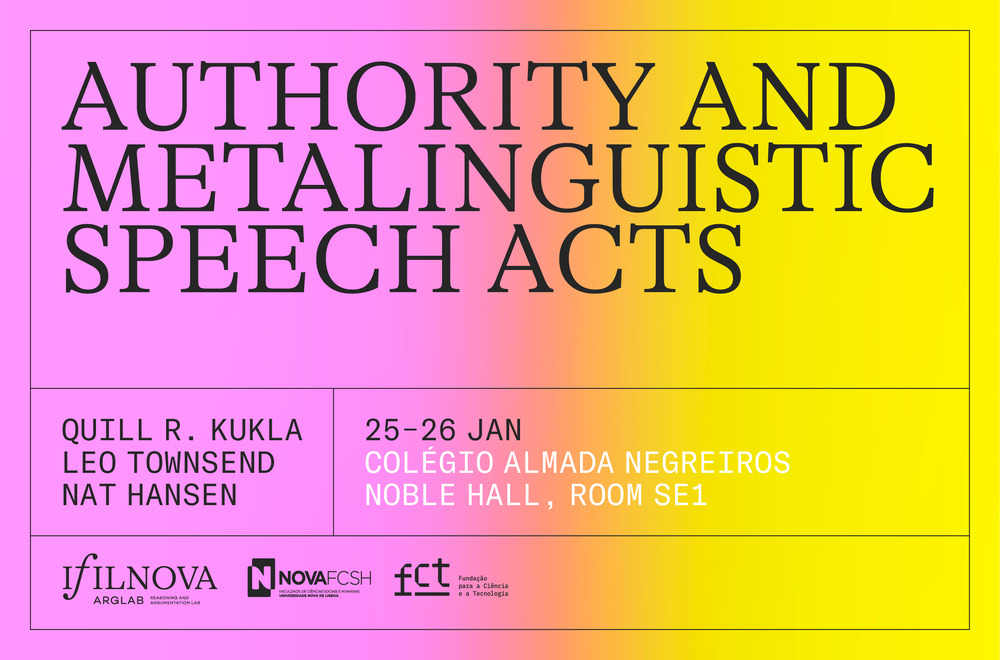Authority and Metalinguistic Speech Acts

25–26 January 2024
NOVA Institute of Philosophy, NOVA University Lisbon, Portugal
KEYNOTE SPEAKERS
Quill R. Kukla (Georgetown University, US)
Leo Townsend (University of Reading, UK)
Nat Hansen (University of Reading, UK)
ORGANISERS
Marcin Lewiński (ArgLab, IFILNOVA, NOVA University Lisbon)
Álvaro Dominguez (ArgLab, IFILNOVA, NOVA University Lisbon)
The literature on metalinguistic disputes studies how important elements of social reality are defined: gender, race, rape, torture, disease, COVID-19 deaths (Haslanger, 2012; Ludlow, 2014; Schiappa, 2003; Plunkett & Sundell, 2013; Kukla, 2022; Lewiński & Abreu, 2022). One underlying assumption behind this work — and yet conspicuously underexplored — is that the authority of speakers-qua-stakeholders plays an important role in such disputes. Indeed, in many significant cases, only (national) parliaments or (supreme) courts have the prerogative to decide on definitional choices. But if this is so, then the weight of one’s engagement in various forms of metalinguistic disputes cannot be evenly distributed: the powerful epistemic and deontic authorities would seem to always have the upper h and. A growing body of recent literature starts addressing this issue (Kitsik, 2022; Podosky, 2022; Shields, 2021).
In its turn, speech act theory, following Austin’s (1962) pioneering work, provides conceptual resources capable of addressing this phenomenon in a theoretically fruitful and socially relevant manner. Speech acts performed in metalinguistic disputes by speakers with authority can be defined as “authoritative illocutions”: speech acts that require the authority of the speaker in a relevant domain to be felicitously performed (Langton, 1993). Even seemingly innocent “metalinguistic proposals” (Hansen, 2021) of ordinary speakers invite authority-based questions: Who is entitled to propose? How is the proposal taken up? All the same, authority dynamics in many real-life examples tend to be much more intricate than the dyadic relations epitomised in the Master-Slave metaphor (Lewis, 1979). A social movement protesting against oppression is endowed with experiential, democratically legitimised authority to argue for their take on “oppression”, even if an individual conservative minister or president has an executive authority to decree what “oppression” officially stands for.
The goal of this two-day workshop is to investigate speech acts that are instrumental in metalinguistic disputes and analyse how authority relations affect, for good or bad, the dynamics of such disputes. In particular, the workshop is centred on two topics. First, how does the authority of speakers affect the performance of metalinguistic speech acts? Is there a difference if the speaker is an individual, a representative of an institution, a member of a group, or an expert in the field, for the successful performance of metalinguistic speech acts (Townsend & Lupin, 2021)? Second, how does the position of the hearer affect metalinguistic speech acts in the sense of uptake (see Kukla, 2014; Kukla & Lance, 2009)? Various forms of silencing (locutionary, illocutionary, and perlocutionary) or distorted uptake (discursive injustice, discursive paternalism, etc.) are especially relevant concerns here.
Programme
Thursday, January 25
Session 1: Salão Nobre (Noble Hall)
9:30–10:00 Registration/Coffee
10:00–11:00 Keynote 1: Quill R Kukla (University of Georgetown, US)
‘Uptake and Consent’
11:00–11:30 Coffee break
11:30–12:15 Marina Terkourafi (Leiden University, NL)
‘Partial speech acts’
12:15–13:00 Marcin Lewiński (NOVA University Lisbon, PT)
‘Triadic authority and metalinguistic appeals’
13:00–14:30 Lunch
Thursday, January 25
Session 2: Room SE1
14:30–15:15 Daniel Skibra (University of Konstanz, DE) and Hadil Karawani (University of Konstanz, DE)
‘Normative generics: Doing things with definitions’
15:15–16:00 Lucija Duda (University of Manchester, UK) and Amalia Haro (University of Granada, ES)
‘Taking back the power: a metalinguistic perspective’
16:00–16:30 Coffee break
16:30–17:15 Eleonora Volta (Vita-Salute San Raffaele University, IT)
‘Sexist ideology and practices of silencing in rape trials: a Performative approach to epistemic exchanges’
Friday, January 26
Session 3: Room SE1
10:00–11:00 Keynote 2: Leo Townsend (University of Reading, UK)
‘Accommodating Spokesperson Authority’
11:00–11:30 Coffee break
11:30–12:15 Vittorio Catalano (University of Milan, IT)
‘Normalizing Things with Words: On Speech and Oppressive Norms’
12:15–13:00 Marlene Valek (University of Cambridge, UK)
‘Step 1: Being Part of the Conversation’
13:00–14:30 Lunch
Friday, January 26
Session 4: Room SE1
14:30–15:15 Cristina Corredor (Spanish National University for Distance Education, ES)
‘Authoritative illocutions and political legitimacy’
15:15–16:00 Manuel Almagro (University of Valencia, ES)
‘Expertise, identity, and manipulation’
16:00–16:30 Coffee break
16:30–17:30 Keynote 3: Nat Hansen (University of Reading, UK)
‘Passionate Metalinguistic Utterances’
Event supported by the Foundation for Science and Technology (Fundação para a Ciência e para a Tecnologia) of the Portuguese Ministry of Education and Science under the project UIDB/00183/2020.

